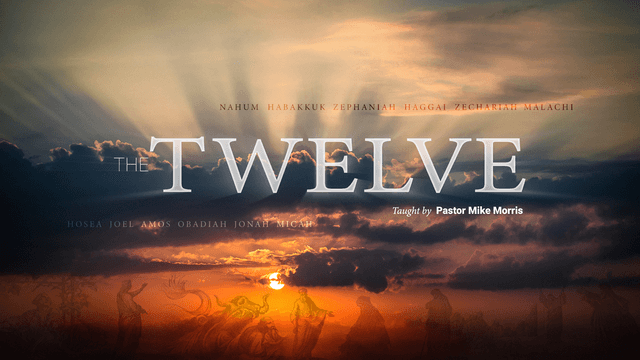Sunday Service 9am & 11am
Wednesday Service 7pm
(210) 920-6502
551 E Nakoma St.
San Antonio, TX 78216
Join a small group to study this sermon with like-minded believers.
Habakkuk 1:1-11
LISTEN. STUDY. APPLY
Video
Audio
Manuscript
Welcome back to our study of the Twelve, the ancient Hebrew name for the Old Testament books that we call the minor prophets...the last twelve books in your Old Testament...they were considered a single entity in the OT scriptures...
Today we begin our study of the book of Habakkuk...it’s a short book, as Zephaniah was...also three chapters, and just a bit longer at 56 verses...but like Zephaniah, there is much the Lord will teach us here…
To see the historical setting, let’s look at the timelines of the two Israelite nations in the time of the divided monarchy, Israel in the north and Judah in the south...
The voices of the prophets ceased in the north as the Assyrians crushed Israel, taking them into captivity in 722 BC, an exile from which they never returned…
Judah endured another 135 years before falling to the Babylonians, the nation which conquered the Assyrians...our studies of Jonah through Zephaniah are available on our website, vbvf.org, under the “Old Testament”...look for the series entitled “The Twelve”
As we begin this journey through the book of Habakkuk, let’s examine some key elements that will help us set this book in its context...
Introduction and background
Author: As 1.1 says, all we know is that a prophet named Habakkuk wrote the book, which doesn’t give us much to go on...most of the prophetic books had more fulsome introductions, often naming the author’s fathers, sometimes back a few generations; or perhaps a location or hometown or even occupation, such as Amos’s prophecy does; or often events are mentioned that help establish a date, usually the reigns of kings, either of Israel or Judah...but in the case of Habakkuk, all we know is that he was a prophet...while this isn’t much, it does tell us something...it affirms what we can infer from the book, that Habakkuk was familiar with the Temple in Jerusalem and the ritual practices carried out there...and because he was known as a prophet, we know his professional life was to serve as a religious official, one who would speak to God for the people, and to the people for God, and it’s in that role that we read his letter, that verse 1 describes as an oracle, a message, that Habakkuk saw...which is a little puzzling, since most of the language of the book is verbal, not visual, though there is a theophany in chapter 3...his name means “embrace” or “caress” in Hebrew, which seems to do little to help us understand this man…
Date: Based on the internal evidence of the book – what the book says within itself – we can place the date between 609 and 597 BC...this date range means Habakkuk was a contemporary of Nahum, Zephaniah, and Jeremiah...and context really matters here, because of the nature of the oracle of Habakkuk and his complaints toward God...it’s helpful to know what would have been happening in that time to cause Habakkuk to turn to God with his questions...the answer lies in three important historical events, all taking place after the fall of Israel to the Assyrians in 722 BC, and before the fall of Judah to the Babylonians…
609 BC: The Egyptian pharaoh, King Necho II, defeats the reformer king of Judah, Josiah, killing him in the Battle of Megiddo; Josiah is succeeded by the King Jehoiakim, a weaker leader of Judah and a vassal of Egypt and then Babylon
605 BC: The rising Babylonian Empire, led by King Nebuchadnezzar, defeats Egypt in the Battle of Carchemish
597 BC: Nebuchadnezzar attacks Judah and takes captive the leaders of the nation, including King Jehoiakim and the prophets Jeremiah and Daniel, taking them into exile in Babylon
So Habakkuk lived and prophesied during a time of national and religious decline, watching the descent of his people into complete sinful apostasy, forsaking their Covenant God, but at a time before it was clearly evident that Babylon would be the instrument of God’s judgment to chastise his wayward people...this is a different message than the books of Micah or Hosea, who warned Israel of coming judgment...let’s examine how Habakkuk is different and why the Holy Spirit gave us this book…
Audience/Purpose: As we think about the audience, to whom the book was written, and the purpose for which it was written, we realize the singularly unique character of this short book...Habakkuk didn’t write his book to call sinful Judah back to God, though they needed that message...in fact, it wasn’t written to Judah at all...rather than speaking FROM God TO the people, Habakkuk speaks a message TO God, and from his own heart and mind, not on behalf of the people of Judah...this is a dialogue similar to the dialogue between Job and God in the last three chapters of that book; this short but powerful book of Habakkuk teaches us that it’s OK to ask God our hard questions, and then listen for His answers...and while we may not always understand the ways of God, we do learn that we can live in faith as we trust Him, even in the midst of our uncertainty...as one author put it, God is the friend of the honest doubter who dares to talk to God rather than about him.
Structure: The book is organized as a sort of private conversation between Habakkuk and Yahweh God...it’s made up of three sections – the first two are alike in terms of their structure, while the third is unique even within this unique book...in fact, if the book of Habakkuk weren’t historically included in the book of the Twelve as a prophetic oracle, we wouldn’t be shocked to find its content in the wisdom books...it is especially similar to the Psalms...the first section, which we’ll cover today is a prayerful lament or complaint, followed by a divine response; the second section follows the same pattern, though both Habakkuk’s lament and God’s response are longer; the third section, the entirety of chapter three, is a prayer, but one with a distinctive musical quality...taken alone, it would fit nicely as a psalm…
Themes: Because of its singular nature, it’s not surprising that the themes in this book are different from other books, especially from other prophetic books...there’s nothing else quite like it in all of Scripture...the prophet calls on God to explain both His actions and inactions, and while God responds, He does so indirectly, which we’ll see in the first two chapters...the book culminates in a timeless and inspiring declaration of faith and trust in God in chapter three...to capture the themes, consider this quote from Heath A. Thomas, in his aptly named commentary on Habakkuk entitled “Faith amid the Ruins”: The center and focus of the book of Habakkuk is living by faith in the light of the faithfulness of God. Elizabeth Achtemeier describes the book from a more divine perspective, but also our response to God: “Habakkuk is above all else a book about the purposes of God and about the realization of his will for his world...a book for all faithful people, of whatever era, who find themselves living ‘in the meantime’—in the time between the revelation of the promises of God and the fulfillment of those promises...Habakkuk is a book from faith for faith.” We listen in as Habakkuk complains to God, and in a real way, challenges the Almighty...he asks some of the same questions we want to ask, and in our most transparent moments with the Lord, DO ask Him...these honest questions form the backbone of the book...in the midst of this dialogue, God gives us many great truths, highlighted by one extraordinary verse that became a clarion call of God to a wayward world, and a spark that lit the Protestant Reformation through the heart and mind of the monk of Wittenberg, Martin Luther...that verse is Habakkuk 2.4, “the righteous shall live by faith”
Let’s get into the text!
“Where are You, God?”
The oracle of Habakkuk begins with questions...the kind of questions that believers think about God, even if we aren’t always bold enough to give voice to them...
2 O Lord, how long shall I cry for help,
and you will not hear?
Or cry to you “Violence!”
and you will not save?
3 Why do you make me see iniquity,
and why do you idly look at wrong?
Destruction and violence are before me;
strife and contention arise.
4 So the law is paralyzed,
and justice never goes forth.
For the wicked surround the righteous;
so justice goes forth perverted.
Habakkuk looks around at his world – a morally and spiritually bankrupt Judah, with the people’s response to God somewhere between disinterest and outright rebellion... political leadership in decline after the death of Josiah, with kings who turn to other nations like Egypt for security instead of turning to Judah’s covenant God; Israel lost to exile in Assyria; his society plagued by violence, wickedness, lawlessness, and rampant evil…
so the prophet turns to God and asks some questions...see if you’ve heard these in your own heart...
Where are You, God?
Why are You silent when I call out for You?
How long must I cry out to You for deliverance?
Why aren’t You listening?
Why won’t You save us?
Why does sin afflict the righteous among us?
Why do you not judge sin and punish sinners?
Do any of those questions resonate with you? If so, you’re not alone...four of the psalmists of Israel cried out to God, too...David, Asaph, Ethan, and Moses all asked the same basic question of God...the question is posed in Psalms 10, 13, 22, and 74: how long, O Lord, until You deliver us, until You act, until You save us? What are You waiting for? Why are You silent when I plead with You? Why aren’t You listening?
You might think these are questions asked by people who don’t believe in God...and sometimes that’s true...but as we read Habakkuk’s words, you hear his heart of faith, but you also hear frustration, disappointment, uncertainty, and confusion...when confronted with unbridled violence and unchecked sin, among a people who are supposed to be God’s own people, it’s not hard to understand why Habakkuk would turn to God with questions...the prophet may well have wondered why, if he was troubled by the destruction and violence in his world, why God didn’t seem troubled by it...as he puts it, why do you idly look at wrong?
Sometimes in our world, too, it seems as if the law is paralyzed...nothing seems to hold wickedness in check...true justice, not what the world calls justice, is absent, or when justice is said to be done, it isn’t actual justice at all, but a perversion of it...the many wicked seem to surround the godly few, and evil thrives...no wonder Christians cry out to God for Him to act, to crush sin, and restore righteousness…
Frankly, many Christians may be puzzled by this passage in Habakkuk about God seemingly not listening...I understand why they would think that, because many of our favorite verses talk about God hearing our cries for help, and God answering us when we call Him...we often turn to passages like Jeremiah 33.3, or Jeremiah 29.10-13…
10 “For thus says the Lord: When seventy years are completed for Babylon, I will visit you, and I will fulfill to you my promise and bring you back to this place. 11 For I know the plans I have for you, declares the Lord, plans for welfare and not for evil, to give you a future and a hope. 12 Then you will call upon me and come and pray to me, and I will hear you. 13 You will seek me and find me, when you seek me with all your heart.
Of course, we love passages like that, because they promise God’s grace and mercy...but take careful note of something...those promises were given to Judah, following Judah’s 70 years of exile in Babylon... When seventy years are completed for Babylon, I will visit you...
Habakkuk’s cry to God is before the exile, at its beginning...Habakkuk was struggling with hearing God in his day...at best, he was looking forward to 70 years in a foreign land, anticipating the promise of God’s blessings, but after the time of exile was complete...
So the point is this: everyone, at one time or another, wonders if God is present...if He’s listening...if He will deliver us...if He will judge the wicked and vindicate the righteous...that’s understandable, and I’m convinced that if we approach God as Habakkuk did, from a heart of faith but with real questions, God is not offended...He is our heavenly Father, and He understands our questions and doubts...but I would caution us all with a warning: our adversary and enemy, the devil, wants us to question God apart from faith...to blame Him, not to turn to Him in an honest faith...so while we ask Him our tough questions, let us also trust Him for the answers...
“I am doing a work...”
Having heard Habakkuk’s questions, God does not remain silent...He responds...let’s listen to what He says:
5 “Look among the nations, and see;
wonder and be astounded.
For I am doing a work in your days
that you would not believe if told.
6 For behold, I am raising up the Chaldeans,
that bitter and hasty nation,
who march through the breadth of the earth,
to seize dwellings not their own.
7 They are dreaded and fearsome;
their justice and dignity go forth from themselves.
8 Their horses are swifter than leopards,
more fierce than the evening wolves;
their horsemen press proudly on.
Their horsemen come from afar;
they fly like an eagle swift to devour.
9 They all come for violence,
all their faces forward.
They gather captives like sand.
10 At kings they scoff,
and at rulers they laugh.
They laugh at every fortress,
for they pile up earth and take it.
11 Then they sweep by like the wind and go on,
guilty men, whose own might is their god!”
I’m confident that Habakkuk was grateful God responded to his questions, but I’m equally confident that he didn’t expect to hear what God had to say...perhaps Habakkuk was hoping for an explanation of why God had not answered before, or how God was going to stay in touch better in the future, or more about God’s plan to judge the wicked and deliver the righteous...I’m kidding, of course...Habakkuk’s honest questions drew from the Lord an honest answer...
It had seemed to Habakkuk that God was absent or silent or uncaring, idly watching the increasing sin in Judah...but none of that was true...God was aware of what was happening in Judah...He knew about the sin and violence and wickedness...and He was at work to deal with the unchecked sin among His people, but it wasn’t the way Habakkuk had hoped for...
God’s plan wasn’t to immediately restore Judah to her former glory, defeat her enemies all around her, and raise up a good and godly king to lead them...instead, God was going to judge His people, punishing them for their rebellion and evil, and He was going to accomplish that through giving them over to the Babylonians...let’s examine God’s plan…
He gets Habakkuk’s attention by using in verse 5 the same two words Habakkuk used in verse 3...”look” and “see” ... prompting the prophet to look and listen to the word of the Lord...Habakkuk thought the Lord wasn’t going to act, now God assures him that He is already preparing His judgment...and it will be so surprising that no one would believe it...as the divine instrument, God will bring about the destruction of Judah and the exile of its people through the actions of a dreaded and fearsome nation to their east…
God’s description of the Babylonians takes special note of four characteristics, all of which would be both overpowering and terrifying to the leaders and people of Judah...
They were proud and godless...vs 7 and 11... They are dreaded and fearsome;
their justice and dignity go forth from themselves... at kings they scoff, and at rulers they laugh...they laugh at every fortress...guilty men, whose own might is their god!” ... the only power Babylon recognized was its own...other nations and rulers were just their next military objective, whether they were Assyria, Egypt, or Judah…
They were brutal and violent...vs 6, 9, and 10... they all come for violence, all their faces forward...for they pile up earth and take it. They were similar to the Assyrians in their brutal form of warfare...the reference to piling up earth refers to building earthen siege ramps against a city’s walls, then eventually entering the city and taking control of it…
They were greedy and grasping...vs 6b and 9b... march through the breadth of the earth, to seize dwellings not their own...they gather captives like sand. Whether it was land and cities, or human captives, the Babylonians were merciless, as the Israelites were soon to discover...
They were swift and lethal...v 8 Their horses are swifter than leopards, more fierce than the evening wolves; their horsemen press proudly on...their horsemen come from afar; they fly like an eagle swift to devour. The Babylonians, particularly their cavalry, were the blitzkrieg, the “lightning war” of their day...their speed and lethality overwhelmed adversaries…
But the most frightening of all was God’s statement in verse 6, the words that must have nearly stopped Habakkuk’s heart: God Himself was raising the feared Babylonian military specifically to bring judgment on Judah...Habakkuk had complained of God not listening to his calls of violence...now God’s response was to bring more violence upon Judah in judgment...it didn’t make sense to Habakkuk, as we’ll see in chapter two, but at least the prophet knew – God heard him and God was at work!
Application
Habakkuk is a book that tackles real challenges in life...how do we live in faith even when we don’t understand what God is doing?...how do we respond when God acts differently than we think He should?...so let’s think about this:
What do we learn when we ask God the tough questions?
We learn that God is aware of all that happens in His creation, and as the righteous Judge, He will surely deal with sin...either the punishment for sin will fall upon Jesus Christ our Saviour and our substitute, or it will fall upon unrepentant humanity who have rejected God...He does not idly look at wrong...God sees and hears and knows, even when we think He’s not paying attention...we can rest assured, in all circumstances, that God knows all things... Hebrews 4.13 in the NLT reminds us Nothing in all creation is hidden from God. Everything is naked and exposed before his eyes, and he is the one to whom we are accountable.
We learn that God is active in our world...He is the Sovereign King and Lord of all and will raise up kings and nations and bring them down as He wills...God is always at His work, as Jesus reminds us in John 5.17 ... “My Father is working until now, and I am working.”... we may not understand His purposes and ways, but we can trust that His choices are always best, even if it means enduring a season of suffering or judgment... I Peter 4.19 reminds us of this truth: Therefore let those who suffer according to God's will entrust their souls to a faithful Creator while doing good.
We learn that God is answering the prayers of His people...God is not offended by our honest questions, or even our doubts, but let us not hold on to our doubts in our hearts and minds...instead, let us rest in faith and trust before our God...remember Isaiah 55.8-9 ... For my thoughts are not your thoughts, neither are your ways my ways, declares the Lord. 9 For as the heavens are higher than the earth, so are my ways higher than your ways and my thoughts than your thoughts.
Let me close with this thought: beloved of the Lord, you can ask God anything...but at the end of the day, trust Him and His Word...

Taught by Mike Morris
Associate Pastor of Verse By Verse Fellowship
The Twelve Series
LATEST SERMONS
BROWSE THE LATEST SERMONS








